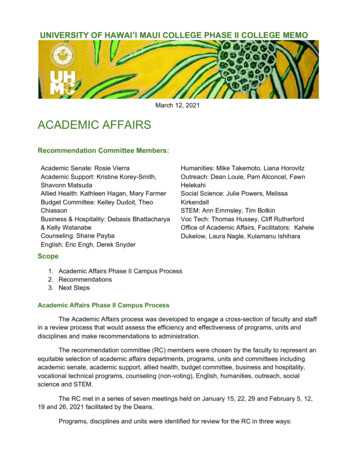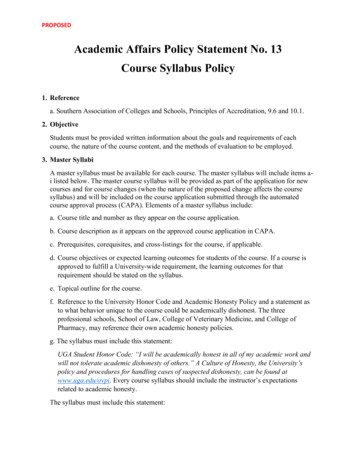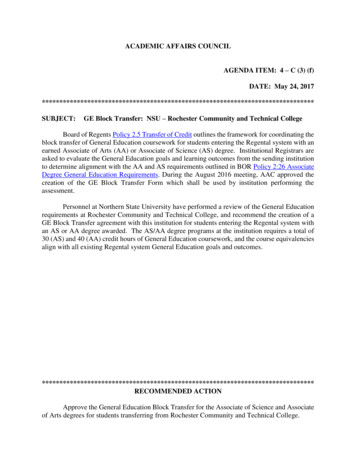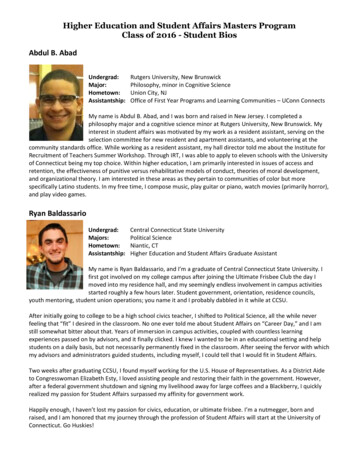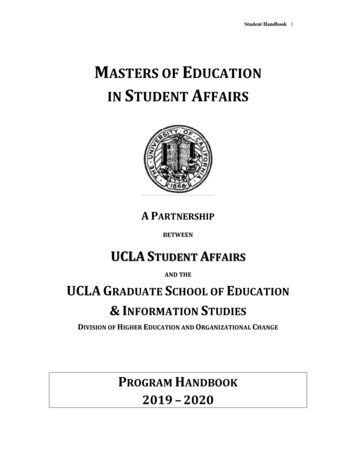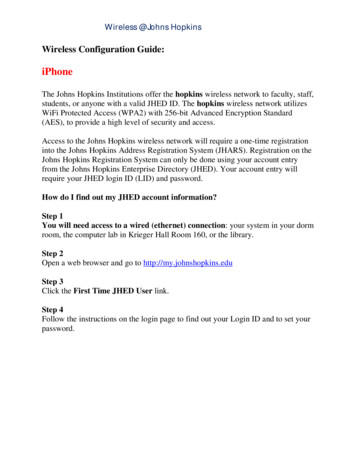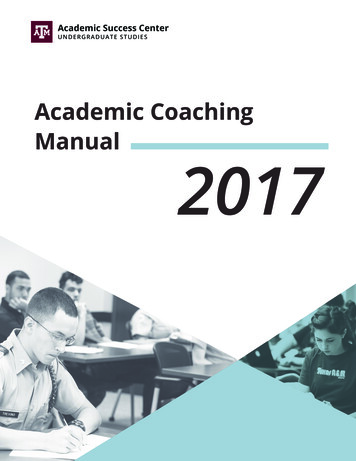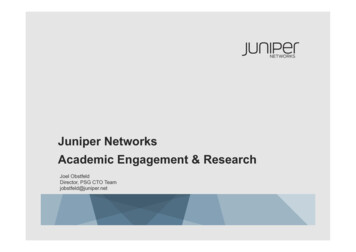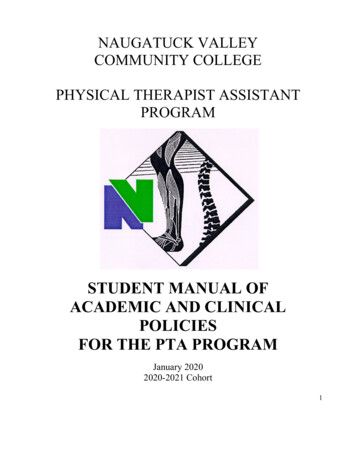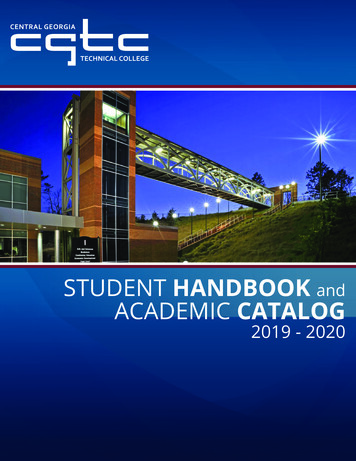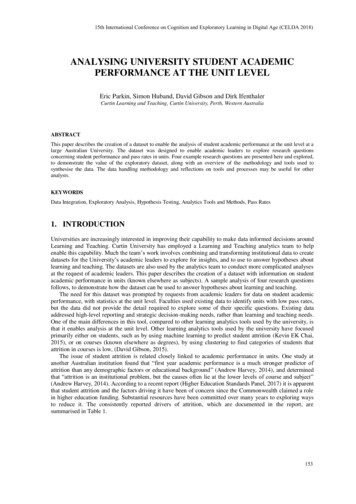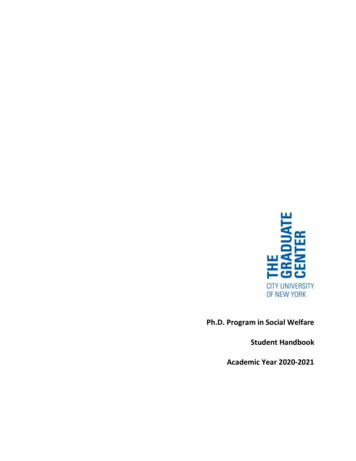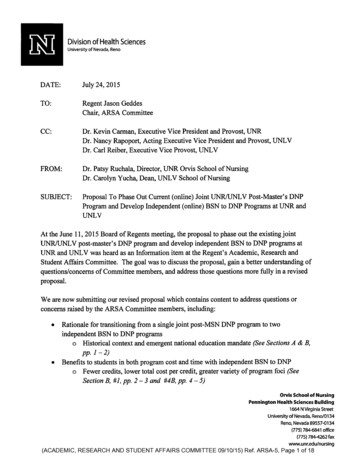
Transcription
(ACADEMIC, RESEARCH AND STUDENT AFFAIRS COMMITTEE 09/10/15) Ref. ARSA-5, Page 1 of 18
(ACADEMIC, RESEARCH AND STUDENT AFFAIRS COMMITTEE 09/10/15) Ref. ARSA-5, Page 2 of 18
ACADEMIC PROGRAM CHANGE FORMDIRECTIONS: Use this form when proposing a change to an existing academic program (e.g. namechanges, structural program changes, etc.). Name changes do not require Board of Regents’ approval.DATE OF REQUEST: 07/24/2015INSTITUTION: University of Nevada, Reno and University of NevadaLas VegasDate of AAC Approval:March 4, 2015Date of Board Approval:NEW NAME (or structural change): Phase Out of Current UNR/UNLVJoint Online Post-Master's Doctor of Nursing Practice (DNP) program andDevelopment of Independent Online BSN to DNP programs (with options for MSN degree stop-out andpost-MSN to DNP tracks) at UNR Orvis School of Nursing and UNLV School of Nursing, respectively.CURRENT NAME (or structure): University of Nevada Joint DNP Program (A collaborative programbetween the UNR Orvis School of Nursing and the UNLV School of Nursing)EFFECTIVE DATE OF CHANGE: Fall 2016 to implement respective independent UNR and UNLVBSN to DNP Programs (with options for MSN degree stop-out and post-MSN to DNP tracks); Spring2017 for final phase out and graduation of students matriculating through UNR/UNLV Joint DNPprogramA. Brief description of proposed changeThe Schools of Nursing at UNR and UNLV have been working collaboratively to offer a postmaster’s DNP program for the past 7 years (including planning years). Initiation of the DNPcollaborative education program into Nevada’s Universities was a well thought-out and well-plannedprocess resulting in the longest term of accreditation for a new program available from ouraccrediting body. The program built on the Essentials of DNP Education from the AmericanAssociation of Colleges of Nursing (AACN) and focused on the expertise and experience of ourexisting faculty at UNLV and UNR. A significant federal grant from the Health Resources andServices Administration (HRSA) and student tuition allowed for the appropriate ongoing planning,implementation, assessment, and modification of the program over the first three years. At the timeof its inception, many schools across the country were developing post-master’s DNP programs tomeet the needs of current MSN-prepared advanced practice nurses and nurse executives. Morerecently, a significant shift has occurred and DNP programs that were previously post-master’scurricular designs have transitioned to post-baccalaureate designs, and the vast majority of recentlyaccredited, newly developed, or under- development programs are BSN to DNP designed curricula.Such streamlined program design gives students more options and helps them save time and money.Our proposed BSN to DNP programs will provide our students these same benefits. In addition,because both institutions will offer the programs as ONLINE PROGRAMS, we will contine to(ACADEMIC, RESEARCH AND STUDENT AFFAIRS COMMITTEE 09/10/15) Ref. ARSA-5, Page 3 of 18
promote and accommodate the need for ease of student access for students across Nevada, whetherthey want to attend UNR or UNLV.B. Justification for proposed change in existing academic programNATIONAL TRENDS and BSN to DNP EDUCATION:For many years, Advanced Practice Nurses (nurse practitioners, nurse midwives, certifiedregistered nurse anesthetists and nurse executives) were educated at the master's degree level aftercompletion of a BSN degree. Due to the increasing complexity of health care and rapid growth inscientific knowledge and technology, master’s degree programs have been forced to increase thedidactic and clinical training for nurse practitioners beyond the requirements of master’s educationin other fields. Therefore, the Doctor of Nursing Practice (DNP) degree was developed as a terminalprofessional practice degree analogous to the PharmD and PsychD clinical doctoral degrees.The Doctor of Nursing Practice (DNP) is a terminal professional practice degree which wasoriginally designed to be a "post-baccalaureate" clinical doctoral degree. In other words, studentswould complete a BSN degree and enroll directly into a DNP degree program, rather than enrollingin an MSN degree program and then a DNP degree program. In fact, in 2004 when the AmericanAssociation of Colleges of Nursing (AACN) membership voted to endorse the DNP degree as themost appropriate degree for the preparation of advanced-practice nurses, AACN members voted toapprove the position that all programs that educate advanced practice nurses should transition to thepost-baccalaureate DNP by 2015 (RAND, 2014). Due to the number of advanced practice nursesalready nationally certified and practicing with a master's degree as their highest level of education,post-master's DNP degree programs were also needed. Therefore, a post-master’s DNP was the goldstandard at the time of our program initiation.Our collaborative program is exactly that with two tracks, Advanced Practice and NurseExecutive. Clear national trends demonstrate that excellent programs, now and into the foreseeablefuture, will be based on post-baccalaureate BSN to DNP curricular formats. New DNP programsopening across the nation are BSN to DNP and many are online programs such as ours. Separatingour joint post-master’s DNP program into separate online BSN to DNP programs offered by bothUNLV and UNR allows both Schools of Nursing to offer excellent graduate nursing educationbuilding on our existing graduate education programs.Leveraging our respective resources and faculty expertise from our current MSN programs willallow the availability of more options for DNP focus areas for BSN to DNP education.UNR will offer track options for the: Clinical Nurse Leader/Nurse Executive Adult/Gerontology Acute Care Nurse Practitioner Family Nurse Practitioner Psychiatric/Mental Health Nurse PractitionerUNLV will offer track options for the: Pediatric Nurse Practitioner Family Nurse Practitioner Educational Leadership (An option for Nurse Executive will be added at UNLV in the near future.)Programs of study for the respective, proposed BSN to DNP program specialty tracks areincluded in the supplemental documents at the end of this proposal form.With the national trend toward development of post-baccalaureate DNP programs (RAND, 2014),with AACN's position that education for advanced practice nurses should transition to the postbaccalaureate DNP by 2015 and with UNR and UNLV's respective faculty strengths and resources(ACADEMIC, RESEARCH AND STUDENT AFFAIRS COMMITTEE 09/10/15) Ref. ARSA-5, Page 4 of 18
to develop multiple independent post-baccalaureate DNP programs, phasing out the current postMSN DNP program and transitioning to the new proposed programs is a natural evolution forgraduate level education for advanced practice nurses in Nevada.COMPETITION FROM OTHER DNP PROGRAMS:Direct competition for students interested in a DNP degree already exists in Southern Nevada.Currently, Touro University Nevada offers an online, 33-credit hour, post-master's DNP program ata cost of 500 per credit hour. Students may also access other online DNP programs, including BSNto DNP, via Capella University, Grand Canyon University, Kaplan University, Maryville University,and others. NSHE institutions must be competitive in offerings to assure Nevada students haveaccess to accredited DNP programs which emphasize the education, experience, and expertise of ourfaculty.ADVANTAGES of SEPARATE UNLV AND UNR BSN to DNP PROGRAMS:1. Proposal Reduces Student Credit Hours, Saving Students Money and Time:Typical MSN programs are 30-48 credits and typical post-master’s DNP programs are 32-50credits. By combining these two degrees into one BSN to DNP degree, it is possible to reduce thenumber of total credits, thereby facilitating student progression at lower costs to the students. Belowis a diagram of current UNLV and UNR respective program credit hour requirements for degreeprogression and the requirements the respective proposed BSN to DNP programs. Credit hourdifferences between UNLV and UNR are due to certification requirements for the respective trackoptions:UNLV’s Current Nursing Degree Progression:BSN (122 credits) MSN (33-46 credits) DNP (39 credits) 72-85 total post-BSN creditsUNLV’s Proposed Nursing Degree Progression:BSN (122 credits) DNP (60-68 credits) 60 - 68 post-BSN creditsUNR’s Current Nursing Degree Progression:BSN (126 credits) MSN (37-52 credits) DNP (39 credits) 76-91 total post-BSN creditsUNR’s Proposed Nursing Degree Progression:BSN (126 credits) DNP (60-76 credits) 60 - 76 post-BSN creditsCollaboration between UNLV and UNR on the joint post-master's DNP program has allowedeach institution to contribute to the realization of an important DNP program in Nevada and torecognize how to maximize existing resources to produce a broader variety of tracks in BSN to DNPcurricula, between the two schools of nursing, meeting the immediate needs of students in thishealthcare field and remaining consistent with national nursing mandates.2. Enrollment in the Joint Post-Master's DNP Program:Over the last few years, our enrollments have been dropping. We believe that this is because thereare numerous other online programs across the country that are more efficient for students. Whywould a student choose Nevada (post master’s DNP 39 credits over 5 semesters or 2 years), whenanother local program is available for 33 credits over 12 months? As shown below, the number ofstudents in the joint post-master's DNP program has been declining, while the number of students inthe MSN programs have been increasing. We believe that by offering a BSN to DNP program, wewill be able to capture many of the students who are currently enrolled in the MSN program. Otherswill have the option to step out of the program after completing the MSN coursework. An informaldiscussion with newly admitted MSN students at UNLV indicated that at least 50% would desire theoption of a BSN to DNP program immediately.(ACADEMIC, RESEARCH AND STUDENT AFFAIRS COMMITTEE 09/10/15) Ref. ARSA-5, Page 5 of 18
# of NEW DNP STUDENTS20102011 2012UNRUNLV# of NEW MSN 132293634412015Anticipated4157503. Proposal Saves Administrative Work:Peoplesoft is designed for the masses of students. Under the current collaborative structure, eachstudent is unique, requiring manual entry and editing of records and manual production of reports.This creates administrative challenges and increases the associated costs. Some of the challenges thatenrollment management and graduate colleges must deal with are shown below.A. Students need to declare a "home" institution, and really only get officially counted as doctoralstudents at that institution. They need to apply as non-degree seeking students to enroll at the other"away" school and then transfer the coursework over to the “home” school as transcripts are updatedand reviewed for graduation.B. The non-degree seeking application and transcript fees are waived for students at the "away"institution requiring memos from the Dean's Office certifying the student's participation in theprogram.C. Coordination of the program is heavily dependent upon support staff to guide students throughthe process, particularly at the "away" institution because it is not intuitive.D. Graduate faculty status must be maintained at each institution so culminating experienceadvisory committees (DNP Project) meet University guidelines.E. Although it is presented as a University of Nevada degree, the degree is actually conferred bythe “home” institution as either a UNR or UNLV diploma.F. See #5 below for discussion of administrative work related to student financial aid.Given the manual work involved in tracking the current small number of DNP students,expanding the collaborative program to the MSN degree (BSN to DNP) will greatly multiply theadministrative challenges, not only as a result of the number of students but because of the increasednumber of courses that must be evaluated for each student each semester.4. Financial Issues--Program Cost:A. The post-master’s DNP program has been a self-supporting program, and financial supportfor the BSN to DNP program will still be needed. Changing the source of program support fromhigher self-supporting fees to state-supported programs with differential fees will be a significantcost-savings to students. From the institutional perspective, differential fees will continue to benecessary for all graduate courses at both UNR and UNLV and will now be applied to graduate-levelcourses in both the master’s programs and the BSN to DNP programs. The differential fees arenecessary due to the high cost of laboratory and practicum courses and because of the lower studentto faculty ratio required of nursing courses.In the new funding formula, UNR and UNLV will count students enrolled in these programs asDoctoral in Health Cluster - Nursing (weight 6.6). While the respective BSN to DNP programs willgenerate funding through the weighted student credit hours in the NSHE formula funding, theformula funding is an acquisition model, and it is not discipline specific. The formula fundinggenerates dollars based on course completions; it does not necessarily allocate those dollars to thedisciplines generating those dollars. Therefore, there is no guarantee that the money generated by theformula funding will be allocated to the respective Schools of Nursing.(ACADEMIC, RESEARCH AND STUDENT AFFAIRS COMMITTEE 09/10/15) Ref. ARSA-5, Page 6 of 18
Differential fees have been and are currently being used to hire faculty and staff and for increasedoperating expenses needed for increased enrollments and program expansions, as was proposed tothe Board of Regents by both UNR and UNLV. With the change from a self-supporting postmaster's DNP program to independent state-funded BSN to DNP programs at UNR and UNLV,repectively, students will pay the regular graduate-level tuition plus the current per creditdifferential fees rate for nursing graduate programs. Coupled with the anticipated increase in studentnumbers, these funds will be sufficient to conduct these programs.B. For students, the financial cost for Nevada residents will drop from the current self-supportingbudget rate of 800/credit to (approximately) 550 per credit for the BSN to DNP degree program(current per credit tuition plus 239.50 per credit graduate-level nursing differential fees).For the Nevada student currently earning both the MSN (33-46 credits - 18,150 - 25,300) andpost-master's DNP (39 credits - 31,200) degrees, this would translate to a (tuition and fees) programcost of approximately 49,350 - 56,500, depending on the MSN track chosen. In the proposedBSN to DNP program, at 550 per credit, tuition and fees would total 33,000 – 37,400 dependingon the focus area track chosen. Using the UNLV Nurse Practitioner track as an example, the studentwould save approximately 19,100 in tuition and fees with the proposed BSN to DNP programoption.5. Financial Issues--Student Financial Aid:Students are accepted and enrolled in the DNP program at either UNR or UNLV. The universitythat offers acceptance is the home school of record for that student. Students take courses at bothUNR and UNLV through a cooperative agreement. Graduate students can only receive financial aidfrom one degree seeking school at a time. For graduate students to receive their federal loans theymust be enrolled for at least 5 credit hours to be considered a half time student. With the DNPprogram the students are not enrolled at either school on a half time basis. They are either enrolledfor 3 or 4 credits at either school. To award the student’s their financial aid, it is a manual process tocheck their enrollment at both schools to ensure that they meet the minimum enrollment status fortheir eligibility for federal loans. The National Student Loan Data System (NSLDS) considers theenrollment at the school they are attending for determining the student’s loan repayment status.When the enrollment is sent in for both schools the student is less than half time at each school sothey go into repayment of their loans. A letter needs to be sent by each school to NSLDS to letthem know that the student is at least a half time student. This needs to be done each semester.6. Student Concerns:Our experiences over the past five years have shown significant difficulties for students who areenrolled in collaborative programs across NSHE institutions. These include administrativechallenges in registration (e.g., need to apply to multiple institutions and pay multiple applicationfees), financial aid issues, and transcript and course tracking issues.A. Academically there are challenges in that the institutional calendars differ (and cannot bemodified due to the trimester calendar basis at UNLV School of Nursing), grade grievance processesdiffer and involve different people depending on the course, communication among faculty based ondifferent campuses is not as open, online courses are constructed differently, and grading policiesdiffer. Graduating DNP student exit interviews have consistently included comments acknowledgingthese issues, such as: (for webcampus course access) “Two separate schools, separate logins,separate everything was hard.”; “The [differing] calendars make it impossible to have any time offand plan anything or decompressing.”; “Different timelines are a nightmare and different breaksmake it impossible to plan.”; “ issue I had was with Financial Aid issue waiting for onedisbursement to pay the other institution.”; and other similar comments.(ACADEMIC, RESEARCH AND STUDENT AFFAIRS COMMITTEE 09/10/15) Ref. ARSA-5, Page 7 of 18
B. Students with balances due on either UNR or UNLV accounts results in an “enrollment hold”and blocks students from registering at either institution.C. Currently, UNR and UNLV both use the same online learning management systems,“BlackBoard .” UNR is considering changing their learning management system to “canvas ”*for Fall 2016. (*NSC, TMCC and CSN all use “canvas ” as their online learning managementsystems.) If this change happens, students enrolled in a joint program between UNR and UNLVwould need to learn two online learning management systems, BlackBoard for UNLV and “canvas”for UNR. We already know having separate online learning platforms is confusing for studentsbecause UNR and UNLV used two different systems when the joint post-master's DNP program wasfirst initiated. Three years ago, the two schools then began using the same system, and with thispotential change at UNR they would have different systems again. Student complaints were aconsistent issue with the differing online learning platforms and would most likely be again.7. Accreditation Issues:Graduation from an accredited program is an expectation of all nursing students in the NSHEsystem. Accreditation is a recognition of the program’s excellence in curricular design andimplementation, faculty expertise, and ultimately, student preparation for success in the healthcareindustry. The respective Schools of Nursing at UNR and UNLV have each received the maximumaward (10 years) for accreditation of both the BSN and MSN/MS programs, UNR on December 31,2011 and UNLV on June 30, 2014. Separating the collaborative post-master's DNP program wouldallow both UNR and UNLV to build on the existing accredited BSN programs and incorporate thecurrent MSN/MS curricula into new BSN to DNP programs with tracks focused on existingexcellent, accredited, MSN/MS program tracks. For the separate BSN to DNP programs, only a fewnew courses would be required and these have already been developed in preparation for thisproposal. Initiation of accreditation of these new programs, built upon an existing program, wouldensue. This process for accreditation described here would be significantly easier
UNR’s Current Nursing Degree Progression: BSN (126 credits) MSN (37-52 credits) DNP (39 credits) 76-91 total post- BSN credits . UNR’s Proposed Nursing Degree Progression: BSN (126 credits) DNP (60-76 credits) 60 - 76 post-BSN credits . Collaboration between UNLV and UNR on the joint post-master's DNP program has allowed
